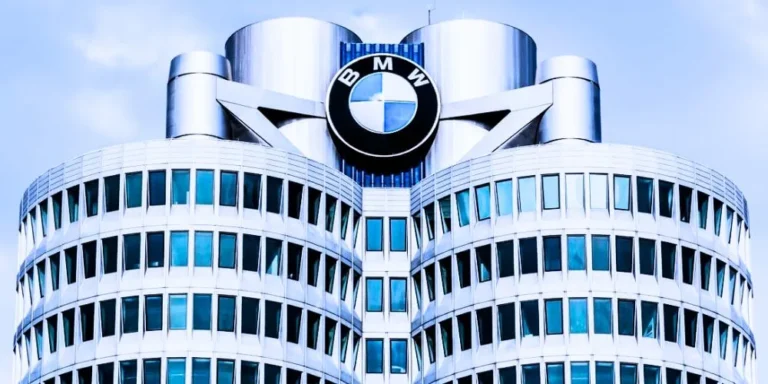BMW Group, also known as Bayerische Motoren Werke AG, is one of the world’s leading automotive manufacturers, renowned for producing high-performance luxury vehicles. Known for its innovative engineering, superior craftsmanship, and commitment to sustainability, the company has established itself as a global leader in the premium automotive sector. With a rich history, a diverse portfolio of vehicles, and a focus on cutting-edge technologies, BMW Group continues to shape the future of the automotive industry. This article delves into the company’s origins, growth, key innovations, strategic acquisitions, business model, and impact on the global automotive market.
BMW Group Company Overview
BMW Group is a German multinational company that designs, manufactures, and sells luxury automobiles and motorcycles, and provides automotive financial services. The company’s iconic brands—BMW, MINI, and Rolls-Royce—are recognized worldwide for their premium quality, performance, and innovation. BMW Group’s headquarters is located in Munich, Germany, and the company operates in over 140 countries, with production facilities across the globe.
Founded in 1916, BMW has transformed from a small aircraft engine manufacturer to a global leader in the premium automotive market. Today, it stands at the forefront of automotive technology, particularly in electric mobility, autonomous driving, and sustainable manufacturing.
Founding and Early Years (1916–1930s)
BMW was founded in 1916 by Franz Josef Popp, Karl Rapp, and Camillo Castiglioni as Bayerische Flugzeugwerke AG (Bavarian Aircraft Works). The company initially focused on manufacturing aircraft engines, which played a critical role during World War I. After the war, the Treaty of Versailles restricted Germany from producing aircraft engines, prompting BMW to diversify its operations.
In the early 1920s, BMW shifted focus to the automotive industry, initially producing motorcycle engines. The company’s first motorcycle, the BMW R32, was launched in 1923 and became highly successful, establishing the company’s reputation in the two-wheeled market. In 1928, BMW entered the automobile industry by acquiring Fahrzeugfabrik Eisenach, a manufacturer of automobiles. This acquisition marked the beginning of BMW’s journey into the automotive sector.
By the end of the 1920s, BMW had established itself as a manufacturer of motorcycles and automobiles. The company’s first car, the BMW 3/15, was introduced in 1929, setting the stage for the brand’s long history of luxury vehicles.
Expansion and Innovation (1930s–1970s)
During the 1930s, BMW became a key player in the luxury automobile market. The company’s success was driven by introducing high-performance cars, such as the BMW 328 Roadster, which gained recognition for its engineering excellence and racing capabilities.
In the post-World War II era, BMW faced significant challenges. The company was forced to rebuild its operations after the war, during which it had stopped manufacturing vehicles due to the destruction of its facilities. In the 1950s, BMW struggled financially and briefly considered merging with other car manufacturers. However, the company regained its footing in the 1960s by introducing a new generation of vehicles, most notably the BMW 1500, which marked the beginning of its success in the premium automobile market.
By the 1970s, BMW was known for producing sporty, luxurious, and high-performance cars, gaining a loyal customer base and securing a strong position in Europe and North America. The company introduced the BMW 3 Series in 1975, which became a brand hallmark and set the standard for future BMW models.
Diversification and Globalization (1980s–2000s)
The 1980s and 1990s marked a period of diversification and expansion for BMW Group. The company continued to innovate by introducing new models and expanding its product offerings. BMW introduced the 7 Series in 1986, cementing its reputation as a luxury car manufacturer. During this time, the company also introduced the M series, a line of high-performance sports cars that became iconic within the automotive world.
In the 1990s, BMW pursued a globalization strategy. The company began expanding its operations into international markets and investing in new production facilities in North America and Asia. A significant turning point came in 1994 when BMW acquired the British car manufacturer Rover Group. This acquisition provided BMW with an expanded product portfolio, including the MINI brand, which became an essential part of BMW’s offerings. However, the acquisition of Rover ultimately proved challenging, and BMW sold the Rover brand in the early 2000s, focusing its efforts on its core brands: BMW, MINI, and Rolls-Royce.
In 2003, BMW Group purchased Rolls-Royce Motor Cars, a luxury automobile brand long associated with prestige and quality. The acquisition strengthened BMW’s position in the high-end automotive market, providing access to a new segment of ultra-luxury vehicles.
Commitment to Innovation and Sustainability (2010–Present)
In the 21st century, BMW Group has remained at the forefront of automotive innovation, focusing heavily on sustainability, electric mobility, and technological advancements. The company introduced its “Project i” initiative in the early 2010s, which led to the development of the BMW i3 and i8 electric and hybrid vehicles. These models reflected BMW’s commitment to environmental responsibility and the transition to sustainable mobility.
The launch of the BMW i3 in 2013 marked a milestone in BMW’s commitment to electric mobility, as it became one of the world’s first premium electric vehicles. The i8, introduced as a plug-in hybrid sports car, demonstrated BMW’s ability to combine performance with sustainability.
In addition to electric vehicles, the BMW Group has focused on advancing autonomous driving, digital connectivity, and shared mobility solutions. The company’s development of the BMW ConnectedDrive system offers advanced infotainment and driver-assistance features, while its ongoing research in autonomous driving aims to make driving safer and more efficient.
BMW has also pioneered sustainable manufacturing, introducing environmentally friendly production processes and materials across its vehicle lineup. The company’s efforts to reduce carbon emissions and its commitment to the circular economy have further reinforced its position as an industry leader in sustainability.
Business Model and Revenue Streams
BMW Group’s business model revolves around designing, manufacturing, and selling high-quality vehicles catering to the premium and luxury segments of the automotive market. The company generates revenue by selling cars under its three leading brands: BMW, MINI, and Rolls-Royce. The BMW Group also provides financial services, including leasing and financing, which contribute to its overall revenue.
BMW’s revenue streams can be broken down into the following key areas:
- Automotive Sales: This is the primary revenue driver for the BMW Group, with sales of vehicles under the BMW, MINI, and Rolls-Royce brands accounting for most of the company’s revenue. BMW has a diversified product portfolio, including compact cars, luxury sedans, SUVs, and sports cars.
- Motorcycles: BMW Motorrad, the company’s motorcycle division, contributes to the overall revenue by producing high-performance motorcycles. These motorcycles are popular in markets worldwide, particularly in Europe, North America, and Asia.
- Financial Services: BMW offers financing and leasing options for both individual buyers and businesses. The financial services division supports vehicle sales and maintains customer loyalty.
- After-Sales Services and Parts: BMW’s after-sales services, including maintenance, repairs, and the sale of spare parts, provide a continuous revenue stream. This segment is significant for building long-term customer relationships and enhancing the ownership experience.
- Sustainability and Innovation: BMW Group’s growing focus on electric vehicles, autonomous driving, and digital services is expected to drive future revenue growth. The development and production of electric and hybrid cars, along with investments in mobility solutions such as ride-sharing and car-sharing services, will play a key role in shaping the company’s future business model.
Global Presence and Market Impact
BMW Group operates in more than 140 countries worldwide, with a strong presence in Europe, North America, Asia, and emerging markets. A network of production facilities, assembly plants, and sales operations supports the company’s global reach. BMW has manufacturing plants in Germany, the United States, China, South Africa, and other key locations, allowing it to meet the growing demand for its vehicles and expand into new markets.
BMW’s market impact is substantial, particularly in the luxury automotive segment, where it competes with other premium brands such as Mercedes-Benz, Audi, and Lexus. The company is known for its commitment to delivering driving pleasure, high-quality engineering, and luxury features, which resonate with customers worldwide.
In emerging markets like China and India, BMW has successfully adapted to local preferences by introducing models tailored to these regions. The company’s strategy of offering a diverse range of vehicles —from compact cars to luxury sedans and SUVs —has helped BMW maintain a competitive edge in the global automotive market.
Challenges and Future Outlook
As the automotive industry faces rapid transformation, BMW Group faces several challenges. One of the most pressing challenges is the shift toward electric mobility. The growing demand for electric vehicles (EVs) presents both opportunities and challenges for traditional automakers, as they must adapt to changing consumer preferences, regulatory pressures, and technological advancements.
BMW has responded to this challenge by aggressively investing in electric mobility, but it must compete with established EV makers like Tesla and new entrants. The development of battery technologies, the expansion of charging infrastructure, and the integration of artificial intelligence and autonomous driving technologies will shape the future of BMW and the automotive industry.
Another key challenge is the global supply chain disruption, particularly during the COVID-19 pandemic. This has affected vehicle production and delivery, leading to delays and increased costs. However, BMW’s global manufacturing network and strong supplier relationships have helped mitigate these impacts.
BMW Group’s focus on sustainability, innovation, and digitalization will be critical to its long-term success. The company’s commitment to electric vehicles, autonomous driving, and mobility services positions it well for the future as it continues to innovate and adapt to the evolving automotive landscape.
Conclusion
BMW Group is a leading global automaker known for its high-performance, luxury vehicles and ongoing commitment to innovation and sustainability. With a rich history and a focus on cutting-edge technologies, the company has positioned itself as a leader in the automotive industry. MW’s emphasis on electric mobility, autonomous driving, and digital connectivity ensures it will remain at the forefront of the industry as it navigates the challenges and opportunities of the future.
With a strong global presence, a diverse product portfolio, and a focus on customer satisfaction, the BMW Group is well-positioned to continue its legacy of excellence and drive future growth in the rapidly evolving automotive market.





